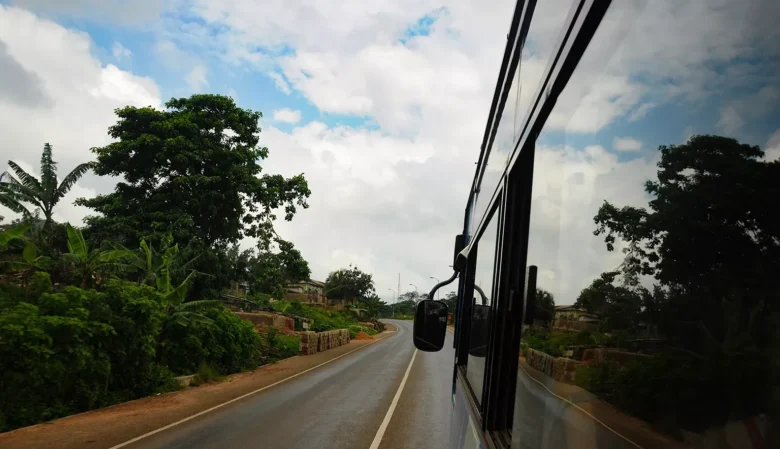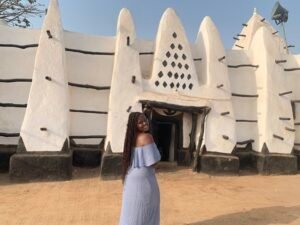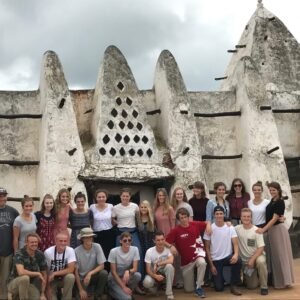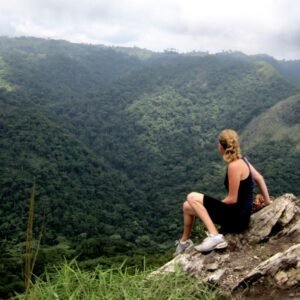Exploring Ghana by road offers the ultimate immersion into the country’s diverse landscapes, cultures, and historical landmarks. From the coastal towns of the south to the rugged savannahs of the north, a road trip through Ghana reveals everything from colonial castles and palm-lined beaches to sacred waterfalls, vibrant markets, and wildlife-filled parks.
This carefully structured South-to-North road trip itinerary guides you through the best stops, including suggested durations, must-see attractions, and practical travel tips.
Overview: Route Snapshot
Start: Accra (Southern Coast)
End: Paga (Northern Border)
Duration: 10–16 days
Total Distance: Approx. 1,000–1,200 km
Best Time to Travel: November to March (dry season)
Day 1–2: Accra – Coastal Capital
Highlights:
- Independence Arch & Black Star Square
- Kwame Nkrumah Memorial Park
- Jamestown: Lighthouse, murals, and Ga culture
- Makola Market: Bustling local life
- Labadi Beach: Chill with music and horse rides
Travel Tips:
- Rent a reliable 4WD or SUV
- Fuel up before leaving the capital
Day 3–4: Cape Coast & Elmina (Central Region)
Distance: ~150 km (3–4 hours’ drive)
Must-See:
- Cape Coast Castle: A UNESCO World Heritage Site with emotional guided tours
- Elmina Castle: The oldest European structure south of the Sahara
- Kakum National Park: Canopy walkway and rainforest hikes
- Hans Cottage Botel: Crocodile pond and eco-lodging
Stay:
- Oasis Beach Resort (budget)
- Coconut Grove Beach Resort (mid-range)
Tip: Take early morning castle tours for smaller crowds.
Day 5: Western Region – Nzulezu Stilt Village (Optional Detour)
Distance: ~4–5 hours from Cape Coast to Beyin
Explore:
- Nzulezu: A unique village built entirely on stilts over Lake Tadane
- Fort Apollonia: Small historical fort with a museum
Notes:
- Boat rides to Nzulezu take ~45 minutes
- Consider staying overnight in Axim or Beyin if taking this detour
Day 6–7: Kumasi – Heart of Ashanti Culture
Distance: ~250 km (5–6 hours via Takoradi or Cape Coast route)
Must-See:
- Manhyia Palace Museum: Home of the Ashanti King
- Kejetia Market: One of the largest open-air markets in West Africa
- Prempeh II Jubilee Museum: Royal regalia and Ashanti artifacts
- Bonwire & Ntonso: Kente weaving and Adinkra stamping villages
Stay:
- Noble House Hotel
- Miklin Hotel
Tip: Join a cultural tour to understand Ashanti traditions better.
Day 8: Kintampo Falls & Fuller Falls
Distance: ~160 km from Kumasi (3–4 hours)
Break your journey with a refreshing visit to these two scenic waterfalls.
- Kintampo Falls: Multi-stage falls with great photo spots and picnic areas
- Fuller Falls: A quieter alternative just 20 minutes away
Optional:
- Visit Boabeng-Fiema Monkey Sanctuary if you have time (~1 hour from Kintampo)
Day 9–10: Mole National Park – Wildlife Safari
Distance: ~200 km from Kintampo to Larabanga/Mole (4–5 hours)
Attractions:
- Walking and jeep safaris in search of elephants, antelope, baboons, and birds
- Larabanga Mosque: Oldest mosque in Ghana with Sudano-Sahelian architecture
- Mognori Eco-Village: Cultural tours, drumming, and canoe rides
Stay:
- Mole Motel (budget)
- Zaina Lodge (luxury)
Tip: Safaris are best done early morning or at sunset.
Day 11–12: Tamale – Northern Gateway
Distance: ~2.5 hours from Mole
What to Do:
- Central Market: Northern textiles, spices, and street food
- Tamale Art Centre: Crafts and leather goods
- Local cuisine: Try Tuo Zaafi or guinea fowl
Stay:
- Gariba Lodge
- Bigiza Lodge
Optional: Fly back to Accra from here, or continue the full route to the border.
Day 13–14: Bolgatanga & Paga (Upper East Region)
Distance: ~160 km (3–4 hours from Tamale)
Explore:
- Bolgatanga Market: Famous for woven baskets and crafts
- Tongo Hills and Tenzug Shrine: Sacred caves and shrines (shirtless entry required)
- Navrongo Cathedral: Built from mud, one of Ghana’s oldest Catholic structures
- Paga Crocodile Pond: Friendly crocodiles, seen as ancestral spirits
Stay:
- Tap Hotel (Bolga)
- Guesthouses in Paga or Navrongo
Optional Add-On: Return to Accra
- Option 1: Fly from Tamale or Bolgatanga via Accra (available on select days)
- Option 2: Drive back to Accra (~2-day return journey via Kumasi)
Road Trip Logistics
Vehicle Hire
- Opt for 4WD if visiting rural or off-grid destinations like Mole and Nzulezu
- Driver hire ranges from $50–$100/day plus fuel
Fuel & Cash
- Fill up in major towns—rural areas often have no petrol stations
- Keep physical cash (cedis), especially in remote areas
Health & Safety
- Travel with a mosquito net and repellent
- Carry a first aid kit
- Always check road conditions during rainy season
Suggested Packing List
- Sunscreen and sunglasses
- Hiking shoes and sandals
- Light cotton clothing
- Water bottle and snacks
- Power bank and travel adapter
- Insect repellent
- Rain jacket (in wet season)
Summary: Itinerary at a Glance
| Day(s) | Location | Highlight |
|---|---|---|
| 1–2 | Accra | Markets, beaches, historical sites |
| 3–4 | Cape Coast/Elmina | Castles, rainforest, history |
| 5 | Nzulezu (optional) | Stilt village and coastal forts |
| 6–7 | Kumasi | Ashanti culture and craft villages |
| 8 | Kintampo | Waterfalls and nature breaks |
| 9–10 | Mole National Park | Safari and wildlife |
| 11–12 | Tamale | Northern cuisine and markets |
| 13–14 | Bolgatanga & Paga | Crafts, shrines, and sacred crocodiles |
Conclusion
A road trip across Ghana from south to north is one of the most rewarding ways to experience the country. You’ll travel through tropical coastlines, colonial towns, vibrant cities, sacred mountains, and wildlife-filled savannahs—all while engaging with welcoming communities and rich traditions along the way.
This journey is more than a vacation—it’s a cross-section of Ghana’s soul.




